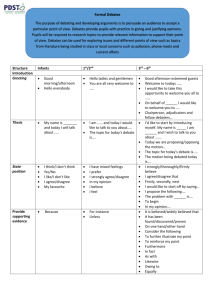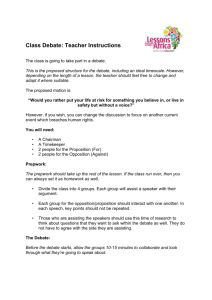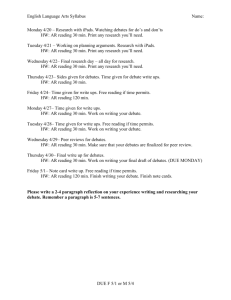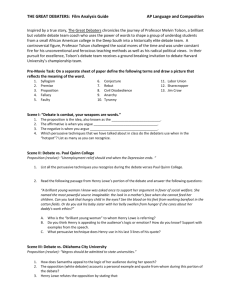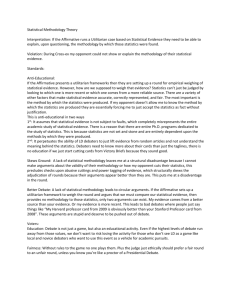GRENLEC Debates Handbook
advertisement
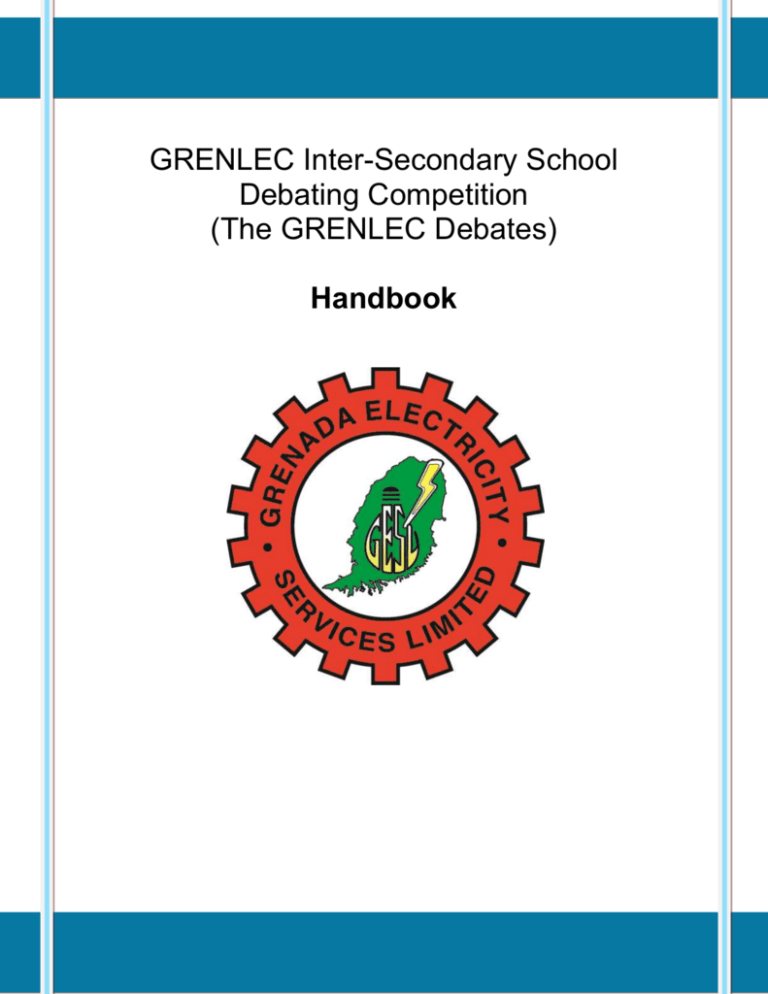
GRENLEC Inter-Secondary School Debating Competition (The GRENLEC Debates) Handbook GRENLEC Debates HANDBOOK Welcome Grenada Electricity Services Ltd. (GRENLEC) is delighted that you have made the decision to participate in the GRENLEC Debates. We see these debates as fundamental tool for broadening the intellectual capital of Grenada, Carriacou and Petit Martinique. Congratulations to our debaters on your selection to represent your school. Please grasp the opportunity to contribute to your development and that of your development of your community through your research and discourse. We hope this forum enables you to grow, hone and demonstrate fundamental life skills. You should become skilled at conducting and analysing research, thinking critically and communicating effectively on your feet. We are grateful for the collaboration of the Ministry of Education, schools, educators, our dedicated volunteer judges and other stakeholders. You enhance the experience of participants and the value to our audience. The GRENLEC Debates begin during the final week of September and culminate around the third week of November. We view it as significant that many of our schools have formed debating and public speaking clubs that operate throughout the year with broad memberships. The life-long benefits of broadening participation in these activities are numerous. Debating engages students in a range of activities that contribute to their personal and academic development. The reports from our partner schools attest to the strong performances of our debaters and we commend you. We look forward to our engagement with you for what we anticipate will be another engaging series of debates on important issues affecting our nation. In the GRENLEC Debate, if your research is sound, if you take the time to prepare, if you work together, and if you strive to improve each time, you are a winner. Please accept our best wishes as you endeavour to meet and exceed the challenges presented through this initiative. Charter To revive debating throughout Grenada To encourage excellence in research and public speaking To promote respect for differing perspectives To promote interest in national and international matters Page 2 GRENLEC Debates HANDBOOK TABLE OF CONTENTS 1. About the GISSDC ................................................................................................... 4 2. About GRENLEC ....................................................................................................... 4 3. Organisation of the GRENLEC Debates .............................................................. 5 3.1 Selection of Teams ................................................................................................................ 5 3.2 Training ................................................................................................................................. 5 3.3 Judges .................................................................................................................................... 6 3.4 Responsibilities ..................................................................................................................... 6 4. Code of Conduct .................................................................................................... 7 5. Guidelines for the Debate .................................................................................. 11 5.1 Summary Skills of Good Debaters ..................................................................................... 11 5.2 Definition and Cases ........................................................................................................... 12 5.3 The Role of the Speakers .................................................................................................... 13 5.4 Seating Arrangement........................................................................................................... 15 6. Appendices ............................................................................................................ 16 6.1 Timekeepers’ Guide ............................................................................................................ 17 6.2 Judges Score Sheet ......................................................................................................... 18 Page 3 GRENLEC Debates HANDBOOK 1. About the GISSDC The GRENLEC Debates are a national championship open to all secondary schools in the tri-island state of Grenada, Carriacou and Petit Martinique. The competition evolved from an initiative developed by the Media Workers’ Association of Grenada (MWAG) in 1996 and 1997 and sponsored by GRENLEC. In 2008, the Grenada Electricity Services Ltd. (GRENLEC) took ownership of the project as the focus of its educational thrust. GRENLEC manages and sponsors the initiative as an annual activity. MWAG continues to provide valuable support in the planning and execution of the project, which has the full endorsement of the Ministry of Education and the support of the Association of Secondary School Principals. Civil society and the private sector are also actively involved, through representation on the Resolutions Committee and the Judging Panel. 2. About GRENLEC The Grenada Electricity Services Ltd. (GRENLEC) is the sole provider of electricity to the state of Grenada, comprised of the islands of Grenada, Carriacou and Petit Martinique. The Company provides integrated services of generation, transmission and distribution. WRB Enterprises of Tampa, Florida owns 50% of the issued ordinary share capital of the Company. Together, the Government of Grenada and the National Insurance Scheme own 21%, employees 4.5% and the remaining 24.5% is owned by approximately 1600 national, regional and international investors. GRENLEC serves more than 40,000 residential, commercial and industrial customers through a workforce of more than 200 employees. The Company owns and operates one main generating station in Grenada with an installed capacity of 39MW, a 1.920MW station in Carriacou and a 483KW station in Petit Martinique. The company is also actively exploring the potential for harnessing renewable energy sources. The approach is to diversify energy sources through a customer renewable energy interconnection programme and a variety of renewable technologies, including wind, solar and geothermal energy. 2007 - GRENLEC established the customer interconnection programme (1% generation). 2012 – Sod-turning for Carriacou Wind Project (jointly funded by GRENLEC and Government of Grenada with a grant from the European Union). 2013 – Rooftop solar projects being implemented in Grenada - Solar system being installed to assist with generation in Petit Martinique. Page 4 GRENLEC Debates HANDBOOK 3. Organisation of the GRENLEC Debates All secondary schools are invited to participate. The first round is a preliminary round. The most recent GRENLEC Debating Champion automatically qualifies for the second round (Round of Sixteen), except when there is an even number of schools participating. Matches and topics are decided by random draw. The winners of each preliminary match progress to the Round of Sixteen. Thereafter, the sixteen team required for the second round will be constituted based on the highest scores of the remaining schools. The Round of Sixteen, Quarterfinals and Semi-finals are all knockout rounds. 3.1 Selection of Teams Teams consist of six (6) team members, constituted by schools, in accordance with the following guidelines: No more than three fifth-form students. Teams must submit a list of all team members and contact information before the start of the competition. The composition of the team cannot be modified, at any point, after the start of the first debate in which a team participates each season. 3.2 Training Schools are encouraged to avail themselves of the opportunities for support through membership in the GRENLEC Debating and Public Speaking Society. An orientation session will be held for trainers/coaches and debaters from each participating school before the start of the competition. Each school may have two (2) official coaches who are responsible for preparing and supervising teams. Schools are encouraged to seek the assistance of other people, who are considered consultants. Page 5 GRENLEC Debates HANDBOOK 3.3 Judges All debates are judged by minimum of three judges. Coaches and consultants do not serve as judges. 3.4 Responsibilities Teams must be present at the time they are invited to be seated for their debate, or be disqualified. Teams are expected to arrive at least 30 minutes before the scheduled start of the first debate of the day. Home Team Prepare suitable hall in advance to stage the debate and assist event planners with setup. Team must be accompanied by at least one coach, who takes responsibility for debaters and other students. Seating arrangements must be made for the following: – Debaters – Judges – Officials – Chairperson – 2 Timekeepers – Audience Appoint a chairperson. Select a timekeeper. Provide room temperature water for debaters, judges and officials. Report any concerns to the event manager. Visiting Team Team must be accompanied by at least one coach, who takes responsibility for debaters and other students. Select a timekeeper. Report any concerns to the event manager. Page 6 GRENLEC Debates HANDBOOK Transportation GRENLEC covers the cost (within reason) of transporting the team and coaches of each visiting team on their assigned debate day. We urge schools to invite other students, teachers and parents to participate by attending the debates. Schools will arrange transportation and present bills to the event manager for reimbursement within (1) week of each debate attended. Bills must have clearly written contact information for service providers. 4. Code of Conduct Purpose of the Code of Conduct The GRENLEC Debates bring together diverse participants for a short, intensive debating exercise. In this environment, it is very important that all participants have a common understanding of the standards of behaviour expected of them in order to maintain a safe and cordial atmosphere. The purpose of this Code is to encourage proper decorum throughout the Championship. To whom does the Code of Conduct apply? This Code applies to the following stakeholders in the Championship: Debaters Coaches/Trainers Team Coordinators Judges Individuals assigned other roles by the host, visiting or organising committee. ALL PARTICIPANTS MUST AGREE TO ABIDE BY THIS CODE OF CONDUCT. Before the start of the competition, the principal of each debating team must sign and return the Code of Conduct and ensure its enforcement for the duration of the Championship. No team will be allowed to participate in the Championship unless the Code of Conduct has been signed. Compliance to the Code (a) All participants shall ensure that they comply with the Code of Conduct for the duration of the Championship. Page 7 GRENLEC Debates HANDBOOK (b) In addition, each school shall appoint a coach and team coordinator who shall be responsible for ensuring that the debaters comply with the Code for the duration of the Championship. (c) A team must be accompanied by at least one teacher, who will take responsibility for students as each debate. (d) No team of debaters shall be allowed to participate in the Championship unless such a team is selected by the school. Articles of the Code of Conduct Do’s • Have the consent of their parent(s) or legal guardian(s) to participate. • Be respectful and courteous in interacting with other participants, guests, officials and members of the public. • Observe rules of responsible academic referencing and research. Subjects interviewed must have the credentials to speak on the particular topic and be credited for their information or ideas. They must be made explicitly aware of the purpose for which they are being interviewed and the manner in which their information will be utilised. To guard against personal liability, consider sending experts copies of quotations or summaries for verification. Don’ts Participants must NOT: • Make any comments, jokes, or insinuations, which may be construed as being derogatory or harassing, about any other person to that person or to anyone else. • Make any statement or use any information or quotation that is offensive or false and harmful to the reputation of another. • Engage in any form of violence or hostile behaviour. • Intentionally cause damage to the property of other individuals or of any host venues. Page 8 GRENLEC Debates HANDBOOK Behaviour Towards Judges 1. Participants in the Championship and supporters must refrain from any display of hostility towards judges or any other officials. 2. Feedback between teams and judges must be given and received in a constructive and non-confrontational manner Enforcement of the Code of Conduct Breaches of the Code should be reported, in writing, to the Coordinator. GRENLEC will appoint a three-person Complaints Committee prior to the start of the competition. One member of the Committee will be nominated by the Association of Secondary School Principals. No principal will be allowed to sit on the committee in a matter pertaining to his/her school. If a participant believes that another participant has breached the Code, he or she may report the breach to the Coordinator. Any matters which cannot be amicably resolved will be referred to the Complaints Committee. The Coordinator, where appropriate, shall address complaints requiring simple intervention on matters pertaining to clarification of issues or other problems through moral suasion. Role of the Complaints Committee 1. Each Complaints Officer shall be responsible for: (a) receiving complaints about breaches of the Code (b) investigating complaints (c) making appropriate recommendations Page 9 GRENLEC Debates HANDBOOK Undertaking This undertaking is required to be signed prior to the commencement of the Championship. Undertaking by all those participating in the GRENLEC Secondary Schools Debating Championship I/We ___________________________________________________________________ undertake that: (a) I/ We have read and understood the Code of Conduct above and (b) I/We will abide by the Code of Conduct for the duration of the ___________(year) GRENLEC Secondary Schools Debating Championship. Signed………………………………………………Dated……………………………… Undertaking by principals of debater(s) participating in the Championship I ____________________________________________________ undertake that: (Principal’s name) (a) I am principal of _______________________________________________ and our debaters are participating in the GRENLEC Secondary Schools Debating Championship. (b) I have read and understood the Code of Conduct above. (c) I have explained the Code of Conduct to the above debaters. (d) I have instructed the above debaters that I expect and require them to abide by the Code of Conduct. (e) The debaters have confirmed to me that they will abide by the Code of Conduct. Signed………………………………… Dated …………………………………… Page 10 GRENLEC Debates HANDBOOK 5. Guidelines for the Debate Debating is the art of persuading through informed, reasoned discourse. By its very nature, it is interactive, requiring debaters to engage each other in a pattern of eloquent speech and response. Debaters must master their subject matter and communicate effectively to persuade their audience, in the given time. There are many different debating styles and we have adapted one that promotes the development of independent thinkers. 5.1 Summary Skills of Good Debaters An effective debater must is able to research and connect relevant information. A good debater listens well, takes charge of his/her time and is succinct. Debaters’ presentations are well structured, demonstrating awareness of the impact of verbal and nonverbal communication. A good debater uses the range of his/her voice, demonstrates tone, inflection and intonation (modulation or rise and fall in the pitch of voice). Debaters employ good microphone handling skills. A good debater thinks on his/her feet. Speeches should sound natural and debaters must have conviction. confidence comes from preparation. Debaters maintain good eye contact that generally spans the audience. A good debater presents his/her arguments with authority, referring to notes periodically, rather than reading. The debater must think, listen, question, take notes, build arguments and deliver persuasively, among other things. Debaters are focused, under an array of circumstances. Debaters are part of a team that empowers each member to do his/her job well, lending to a display of the interrelated nature of speaking, listening and questioning. Page 11 This GRENLEC Debates HANDBOOK 5.2 Definition and Cases The Proposition must present a reasonable definition of the motion. This means: On receiving a motion, both teams should ask: ‘What are the issues to be debated? On listening to the motion, what would the audience think about it?’ If the motion, poses obvious issues for debate, the Proposition must define the motion accordingly, ensuring that the definition is one the audience would be able to comprehend. If there is no obvious meaning to the motion, the range of possible meanings is limited to those that allow for a reasonable debate. Choosing a meaning that does not allow the Opposition room for debate would not be a reasonable definition. Truisms and tautologies leave the Opposition no room for debate and are clearly illegitimate. Defining absolute words literally may prevent a reasonable debate, and they can therefore be read down. When defining the words in the motion (i) to allow the obvious meaning to be debated or (ii) when there is no obvious meaning, to give effect to a possible meaning that would allow for a reasonable debate. If the Proposition’s definition is unreasonable, the Opposition may: Accept it and debate the motion. Challenge it and propose an alternative, reasonable definition and present a case based that supports its position. Broaden the debate, in relation to the words in the motion, if the Proposition has unreasonably restricted the motion. Page 12 GRENLEC Debates HANDBOOK 5.3 The Role of the Speakers First Round: The 1st speaker will speak for five (5) minutes. The role of the first speaker of the Proposition is to define the topic, establish the issues, outline the Proposition’s case, announce the case division between the speakers and present his or her part of the case. The role of the first speaker of the Opposition is to challenge the definition, if necessary; to present an alternative definition, if necessary; to respond to the Proposition’s case; to outline the Opposition’s case; to announce the case division; and to present his/ her part of the case. If the first speaker for the Opposition does not challenge the definition established by the first speaker for the Proposition, the Opposition is taken to have accepted the definition. In such a case, this definition will be recognised as the working definition and may not be altered, in any way, by any member of the Proposition or Opposition. In responding to the Proposition’s case, the Opposition may present a case of its own, or merely attack the case presented by the Proposition. If it chooses to present a case of its own, it must do so through arguments and not concentrate solely on attacking the case presented by the Proposition. No points of information during this round. Second Round The 2nd speaker will speak for four (4) minutes. The role of the second speaker of the Proposition is to deal with the definition, if it has been challenged; to respond to the Opposition’s case; and to continue with the Proposition’s case, as outlined by the first speaker. If the second Proposition speaker does not challenge a re-definition of the debate made by the first Opposition speaker, the Proposition is taken to have accepted the Opposition's re-definition and no further alterations to the definition may be made. Page 13 GRENLEC Debates HANDBOOK The role of the second speaker of the Opposition is to deal with the definition if it is still an issue, respond to the Proposition’s case and continue with the Opposition’s case, as outlined by the first speaker. No points of information during this round. Third Round – Points of Information Points of Information may be comments, questions or requests for information related to the motion being debated. 2 speakers from each team will offer and accept Points of Information (POI). Teams can use their 1st or 2nd speaker and one other speaker during this round or 2 new speakers. Only these four debaters will participate in the debate during this round. Each team must respond to all POI directed to it. Each team will have 2 ½ minutes during this round • Time for offering POI – 15 Seconds • Response time – 30 Seconds The opposition will direct its comments/questions first. Fourth Round – Rebuttals The aim of rebuttal is to present information and evidence that contradicts or invalidates information presented by an opponent. Use the opportunity to strengthen your case by dissecting your opponent’s case and leave a lasting and favourable impression on your audience. Teams will have 3 minutes after Round 3 to prepare a 2-minute rebuttal to be presented by a debater who has not presented in the prior 3 rounds. The opposition will present its rebuttal first. Page 14 GRENLEC Debates HANDBOOK Penalties: Debaters will be penalised for speaking beyond the allotted time as follows: • 2 points for the first additional 15 seconds or any part thereof; • Thereafter, 2 points will be deducted for every additional 15 seconds or any part thereof. • 5.4 There is a 5-second grace period for each speaker beyond the allotted time in Rounds 1, 2 and 4. In Round 3, speakers must stop speaking as soon as the time is indicated. Time penalties will apply as soon as the buzzer sounds) Seating Arrangement Page 15 GRENLEC Debates HANDBOOK 6. Appendices Page 16 GRENLEC Debates HANDBOOK 6.1 Timekeepers’ Guide Date:………………………………….. Venue………………………………..……… Topic:………………………………………………………………………………………. Proposition:………………………………………………………………………………… Opposition:………………………………………………………………………………… 1. BUZZER: After an indication from the judges, a single buzz is used to let the speaker know that he/she can now begin. (Start timer as soon as the speaker has uttered the first word) Ensure that both timekeepers are synchronized. 2. A single buzz alerts the speaker that he/she has one more minute in Rounds 1, 2 and 4. 3. A double buzz indicates the end of the allotted time in rounds 1, 2 and 4. 4. In round 3, a single buzz signals the end of 15 or 30 seconds allocated for making and responding to POIs, respectively. A double buzz indicates the end of time (21/2 mins.) for each team. 5. The stopwatch is stopped at the end of each speech and POI and the time is recorded. You should recheck with your colleague to ensure that the times are synchronized. 6. The time utilised by each speaker should be written down in the appropriate space. TIME SHEET Proposition (insert the Time name of each speaker) allowed 1st speaker 5 minutes Time Opposition(insert the Time utilised name of each speaker) allowed 1st speaker 5 minutes 2nd speaker 4 minutes 2nd speaker 4 minutes 3rd Round – Points of Information (POI) 2 ½ minutes 3rd Round – Points of Information (POI) 2 ½ minutes Rebuttal Total 15 sec. POI 15 sec. POI 30 sec. response 30 sec. response 15 sec. POI 15 sec. POI 30 sec. response 30 sec. response 15 sec. POI 15 sec. POI 30 sec. response 30 sec. response 15 sec. POI 15 sec. POI 30 sec. response 30 sec. response 15 sec. POI 15 sec. POI 30 sec. response 30 sec. response 2 minutes 13 ½ Rebuttal NAME OF TIMEKEEPER……………………………………….. Signature…………………………………………………………… Page 17 2 minutes 13 ½ Time utilised GRENLEC Debates HANDBOOK 6.2 Judges Score Sheet GRENLEC DEBATE JUDGES' SCORE SHEET 2013 Name of Judge: Proposition: Opposition: Location: Date: Score each out of 10 points- Below average (1 or 2) Average (3 or 4) Above average (5 or 6) Exceptional (7 or 8) Flawless (9 or 10) GRAND TOTAL Time Deductions TOTAL SUBTOTAL Professionalism Effective use of Notes (limited reading) Conviction Body language DELIVERY SUBTOTAL Rhetoric Use of Language SUBTOTAL EXPRESSION Clarity & Logic Links to Motion Evidence of Research COVERAGE/CONTENT Relevance and credibility Motion: PROPOSITION 1st. Speaker: 2nd Speaker: POI Offered POI Responses Rebuttal OVERALL SCORE /40 /40 /40 /40 /40 /200 /20 /20 /20 /20 /20 /100 /40 /40 /40 /40 /40 /200 /100 /100 /100 /100 /100 /500 /100 /100 /100 /100 /100 /500 OPPOSITION 1st. Speaker: 2nd Speaker: POI Offered POI Responses Rebuttal OVERALL SCORE: /40 /40 /40 /40 /40 /200 /20 /20 /20 /20 /20 /100 /40 /40 /40 /40 /40 /200 /100 /100 /100 /100 /100 /500 /100 /100 /100 /100 /100 /500 Judge's Signature: Chief Judge's Name: Page 18 Chief Judge's Signature:
